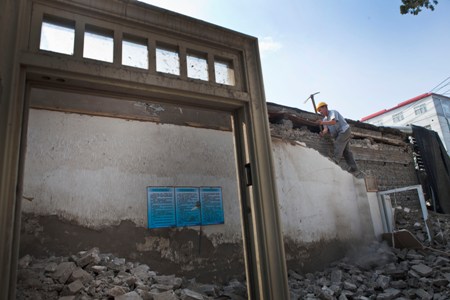Xicheng demolishes Pu Yi’s last home

The former residence of the last Chinese emperor, Aisin-gioro Pu Yi, has been torn down after the structure was allegedly damaged beyond repair by the July 21 rainstorm.
The residence, in Dongguanying Hutong, Xicheng district, was in ruins on Wednesday, with several construction workers clearing up the bricks.
A sign read that the work started on August 10, with eight houses to be demolished.
Sun Tiexiang, vice director with the Xinjiekou housing management department, confirmed they had demolished Pu Yi's residence, reported the Beijing News Wednesday.
"Destroyed by the rainstorm, the residence has safety problems," he said, adding that since the house is neither a cultural protection unit nor officially recognized as the former residence of a celebrity, it was demolished just like an ordinary old house.
Dong Jinhui, a staff member from the same department, who is responsible for construction work, told the Global Times Wednesday that there is a certificate to show that the residence was a dangerous building, but that it is to be reconstructed.
"We'll rebuild it according to its original look," he said.
Cultural heritage activist Zeng Yizhi, said the house should not have been demolished as Xicheng district culture committee knows that the residence has historical value.
Chen Guangzhong, former president of China University of Political Science and Law, said that back in 2009, he had already applied to Xicheng district culture committee to have the house listed as an immovable cultural relic.
He told the Global Times he received a response a week later, asking him to wait their answer.
"But I haven't had one yet," he said.
The residence is of unique historic significance, said Chen.
"Pu Yi was an emperor but lived there with his wife as an ordinary citizen from 1963 until he died in 1967," he said.
"It's a pity these old buildings are disappearing when we are applying for protected status for them," Zeng noted.